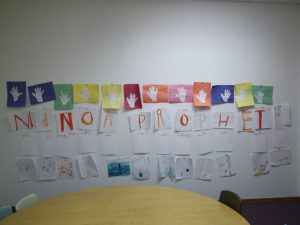
“(For he saith, I have heard thee in a time accepted, and in the day of salvation have I succoured thee: behold, now is the accepted time; behold, now is the day of salvation.)”
2 Corinthians 6:2
The kings of Judah repeatedly wavered between worship of God and idol worship. They often led the people in idol worship. This was in direct disobedience to what God commanded and required of His people (see Exodus 34:10-17; Deuteronomy 29:10-29). King Manasseh (the worst king of Judah) led the people deeply into idol worship. He was very wicked, and although he humbled himself before God and took away the strange gods from the land, his son Amon restored them once he became king. Amon died after being king for only two years, and his son, Josiah, became king of Judah. Because the people were so deeply involved in idol worship, they should have expected God’s judgment. Judah had witnessed God’s judgment fall upon Israel for their departure from God as they were carried captive by Assyria (see 2 Kings 17:6-18). Judah, too, had forsaken God and disobeyed His commands. God sent a prophet named Zephaniah to speak during the reign of King Josiah.
Zephaniah declared the words from God: “I will utterly consume all things from off the land, saith the LORD” (Zephaniah 1:2). The people should have recognized the severity of this warning; especially after having witnessed what the Assyrians had done to Israel, the kingdom to the north. However, Zephaniah explained further what God would do. “I will also stretch out mine hand upon Judah, and upon all the inhabitants of Jerusalem …” (Zephaniah 1:4a). God was speaking in judgment against the nation of Judah and the city of Jerusalem.
Zephaniah listed six particular things that God would deal with; things God wanted them to understand (see Zephaniah 1:4b-6):
- “4b. and I will cut off the remnant of Baal from this place”. God is dealing with their idolatry.
- “and the name of the Chemarims with the priests”. The word chemarims means “priests who led the people in idolatrous worship.” God would deal with the priests who led the people in this idol worship.
- “5. And them that worship the host of heaven upon the housetops”. The people were involved in astrology (think horoscopes): worshiping the sun, moon, and stars.
- “and them that worship and that swear by the LORD, and that swear by Malcham”. The word malcham means “the national idol of the Ammonites. Another name for Molech.” These people had a “religion” where they worshiped God and Molech. They had forgotten: “Hear, O Israel: The LORD our God is one LORD” (Deuteronomy 6:4). They compromised wanting to have a part in both. Remember of what they were warned: “14. Ye shall not go after other gods, of the gods of the people which are round about you; 15. (For the LORD thy God is a jealous God among you) lest the anger of the LORD thy God be kindled against thee, and destroy thee from off the face of the earth” (Deuteronomy 6:14-15).
- “6. And them that are turned back from the LORD”. This is apostasy – one who knew God but turned their back on Him, forsaking Him. Read some insight in the New Testament as to how God feels about this. “20. For if after they have escaped the pollutions of the world through the knowledge of the Lord and Saviour Jesus Christ, they are again entangled therein, and overcome, the latter end is worse with them than the beginning. 21. For it had been better for them not to have known the way of righteousness, than, after they have known it, to turn from the holy commandment delivered unto them” (2 Peter 2:20-21).
- “and those that have not sought the LORD, nor enquired for him”. This is describing one who has never known the Lord. This had happened before. “…and there arose another generation after them, which knew not the LORD, nor yet the works which he had done for Israel” (Judges 2:10). Ones we call lost.
Because the people had continually rejected God as their Lord, God would now be to them a judge. However, before judgment would fall, there was an invitation to return to Him. “2. Before the decree bring forth, before the day pass as the chaff, before the fierce anger of the LORD come upon you, before the day of the LORD’S anger come upon you. 3. Seek ye the LORD, all ye meek of the earth, which have wrought his judgment; seek righteousness, seek meekness: it may be ye shall be hid in the day of the LORD’S anger” (Zephaniah 2:2-3). Those who turned to God were “hidden” in the day of His anger.
What is the importance today of remembering the words Zephaniah declared from God to the Israelites? Paul preached on Mars Hill to all those who met together to discuss their gods and philosophies of the day. He called their attention to the altar of the “unknown god” to teach them of the God they did not know: “27. That they should seek the Lord, if haply they might feel after him, and find him, though he be not far from every one of us: 28. For in him we live, and move, and have our being … 29. Forasmuch then as we are the offspring of God, we ought not to think that the Godhead is like unto gold, or silver, or stone, graven by art and man’s device. 30. And the times of this ignorance God winked at; but now commandeth all men every where to repent: 31. Because he hath appointed a day, in the which he will judge the world in righteousness by that man whom he hath ordained; whereof he hath given assurance unto all men, in that he hath raised him from the dead” (Acts 17:27-31). Paul pointed them to Jesus.
“(For he saith, I have heard thee in a time accepted, and in the day of salvation have I succoured thee: behold, now is the accepted time; behold, now is the day of salvation.)” (2 Corinthians 6:2). The invitation to come is still given today.
Have you heard the invitation to seek after God only, by recognizing Jesus as your Lord?


